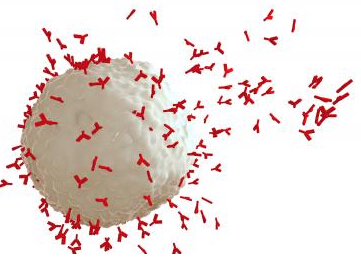麦吉尔大学蒙特利尔神经学研究所研究人员发现了一种类型的B细胞,这些B细胞可能助长了多发性硬化(MS)患者体内的炎症,MS过去一直被视作是一种由T细胞驱动的疾病。这些发现帮助解释了一个长期存在的问题,这就是为什么B细胞移除疗法在MS病人中有效,它提示选择性地消除这群失控的B细胞或能给MS及其它可能的自身免疫性疾病提供一个更有针对性的疗法。在MS这种疾病中,免疫系统(主要是T细胞)会攻击髓鞘;髓鞘是一种衬垫并保护神经纤维的脂质物质。为什么B细胞耗竭疗法(该疗法将细胞从血液中移除)被证明对治疗MS有效大体上一直是一个谜团,尤其是因为这种治疗对B细胞产生的抗体影响很小。B细胞还有其它重要的功能,如分泌细胞因子,而细胞因子是一类信号蛋白,它们或是压制炎症或是促发炎症。然而,人们对MS中产生细胞因子的B细胞的作用所知甚少。在对MS患者和健康人血液样本中的B细胞进行分析后,Rui Li和同事发现了一个B细胞亚群,这些B细胞会产生一种叫做GM-CSF的强力促炎因子,GM-CSF已知会刺激脑内的炎症。与健康人相比,这些促炎B细胞在未经治疗的MS患者中异常多而且更容易被激活。在细胞培养中,产生GM-CSF的B细胞会刺激被称作髓系细胞的血细胞分泌促炎细胞因子,后者可能会激活T细胞。研究人员发现,在经历了B细胞耗竭疗法后,病人产生GM-CSF 的B细胞数明显减少,促炎反应降低,表明该疗法可能消除了该B细胞亚群。这些裨益在治疗后持续长久,甚至持续到病人已经形成了新的B细胞之后。这些结果表明,以这一失控B细胞群作为标靶或能为像MS这样的自身免疫疾病提供一个潜在的治疗策略。由Ari Waisman和Thomas Korn撰写的相关《焦点》文章更为详细地讨论了这些发现。

众所周知,B细胞会产生抵御外来入侵物的抗体。它们还有诸如分泌细胞因子等其它重要功能;细胞因子是小分子信号蛋白,它们能压制或促发炎症。
原文链接:Proinflammatory GM-CSF–producing B cells in multiple sclerosis and B cell depletion therapy
原文摘要:B cells are not limited to producing protective antibodies; they also perform additional functions relevant to both health and disease. However, the relative contribution of functionally distinct B cell subsets in human disease, the signals that regulate the balance between such subsets, and which of these subsets underlie the benefits of B cell depletion therapy (BCDT) are only partially elucidated. We describe a proinflammatory, granulocyte macrophage–colony stimulating factor (GM-CSF)–expressing human memory B cell subset that is increased in frequency and more readily induced in multiple sclerosis (MS) patients compared to healthy controls. In vitro, GM-CSF–expressing B cells efficiently activated myeloid cells in a GM-CSF–dependent manner, and in vivo, BCDT resulted in a GM-CSF–dependent decrease in proinflammatory myeloid responses of MS patients. A signal transducer and activator of transcription 5 (STAT5)– and STAT6-dependent mechanism was required for B cell GM-CSF production and reciprocally regulated the generation of regulatory IL-10–expressing B cells. STAT5/6 signaling was enhanced in B cells of untreated MS patients compared with healthy controls, and B cells reemerging in patients after BCDT normalized their STAT5/6 signaling as well as their GM-CSF/IL-10 cytokine secretion ratios. The diminished proinflammatory myeloid cell responses observed after BCDT persisted even as new B cells reconstituted. These data implicate a proinflammatory B cell/myeloid cell axis in disease and underscore the rationale for selective targeting of distinct B cell populations in MS and other human autoimmune diseases.

